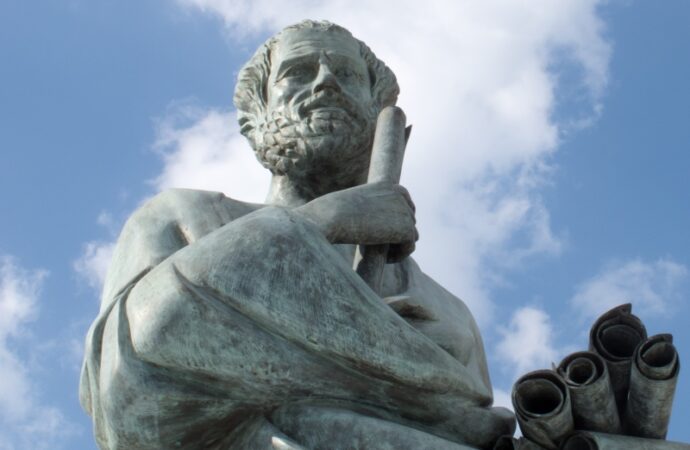Which forms of government are best? Philosophers have sought to answer this question for millennia. Few, however, have done so with the clarity and precision of Aristotle.
In Politics, the Athenian philosopher provides a simple yet insightful schema as part of his investigation of the best regime. He argues that there are six regimes overall but that only three are correct.
What makes a regime correct? In Aristotle’s conception, “those regimes which look to the common advantage are correct regimes according to what is unqualifiedly just, while those which look only to the advantage of the rulers are errant, and are all deviations from the correct regimes.” In other words, a regime is correct only if it serves the interests of society overall and not just its ruling elite.
The first correct regime is kingship, which occurs when a single ruler governs wisely in the common interest. Aristotle refers to kingship as “the first and most divine” form of regime. For that reason, its deviant counterpart, tyranny, “must necessarily be the worst.”
Aristotle defines tyranny as “monarchy with a view to the advantage of the monarch”—when a single ruler governs for himself at the expense of the people, who are ruled unwillingly. Aristotle writes, “no free person would willingly tolerate this sort of rule.”
Aristocracy is the second correct regime. This form of government entails the rule of a virtuous few in the common interest. Aristotle argues that “aristocracy would be more choiceworthy for cities than kingship (whether the office brings power with it or not), provided it is possible to find a number of persons who are similar.”
Oligarchy is the deviant form of aristocracy, and Aristotle describes it as “that in which those who are well off and few in number have the offices.” The philosopher argues that oligarchies, like tyrannies, are “short-lived regimes.” But he also writes that “an oligarchy marked by concord is not easily ruined from within.”
The third deviant regime, democracy, is one in which the poor masses rule for their own benefit and at the expense of the wealthy. The Athenian writes, “Democracy exists when the free and poor, being a majority, have authority to rule.” And although democracy has a more positive connotation in today’s world, Aristotle viewed it as deviant because it is unjust to the wealthy and successful.
Of polity, the third correct regime, Aristotle writes: “Polity is a mixture of oligarchy and democracy. It is customary, however, to call polities those sorts that tend toward democracy, and those tending more toward oligarchy, aristocracies, on account of the fact that education and good birth particularly accompany those who are better off.”
Polity is best understood as a mixed regime, one which combines elements from both oligarchy and democracy. From oligarchy, polities incorporate elected offices, and from democracies, polities offer offices without assessment.
While they are thousands of years old, Aristotle’s six regimes should not be viewed as the outdated products of a distant age. Like other ideas from antiquity, they offer us much even in our modern world. The principles at play—rule of the few, the many, and to what end?—are applicable today. But above all, Aristotle’s Politics teaches us that the purpose of government is the common good—and that forms of political organization are, ideally, means to that end.
—
Image credit: Wikimedia Commons-Alvaro Marques Hijazo, CC0 1.0
5 comments















5 Comments
Greg Penglis
March 8, 2023, 12:36 amAristotle forgot, or didn't know about, the most important and best form of government. A Republic! Maybe we had to wait for Plato. I'm not sure. Point is a government limited by a Constitution, with defined rights in a Bill of Rights, where a Separation of Powers exists between the States and the Central Government, where the purpose is to protect life, liberty, and the pursuit of happiness, that is the best system. Sure wish we had that in the US today.
I am the creator of the Action Radio Citizen Legislature, first show to write and advocate laws written by regular citizens to all levels of government, for the purpose of recreating the Republic we had at our Founding.
BlogTalkRadio.com/citizenaction
Come on the show sometime! Be my guest!
REPLYTaylahGsell
March 10, 2023, 3:35 pmGoogle pays $210 per time unit for doing best and easy job from home. Am Earning $17,000 so Far this year working 0nline. I am a full time college student and just working for 3 to 4 hrs a day. Everybody must try this job now by just use this link..
==–=>>>>) http://Www.Coins71.Com
REPLYRobert
March 11, 2023, 3:39 pmWith regard to our "democracy", it is imperative that we maintain and even build a strong middle class of citizens. Middle class people have one foot in the poor class and the other foot in the wealthy class. So, if the middle class rules the democracy, that would be best for our Republic.
REPLYSteve Warga
June 2, 2024, 3:36 pmBegging to differ with Mr. Whitney (et al., I should add), neither Aristotle nor Socrates nor any other ancient luminaries 'wrote' anything. Nor did any of them (Jesus included) ever record anything.
Therefore, anything attributed (reverently or not) to one of these ancients is the work of at least one other person prone … as most of us are … to " private interpretation" as that individual deems to be more correct.
Should we then discount or ignore those thoughts and ideas promulgated as Aristotle's, or Socrates' or even Jesus "Christ's"? That's more of an individual decision than a "we should" sophistry.
But it seems wise to point out that "we should" deploy a healthy skepticism in choosing our individual beliefs.
In other words, "thimk" for yourself!
REPLYKelci Mitton
December 17, 2024, 2:37 pmWhy are the 6 of them?
REPLY